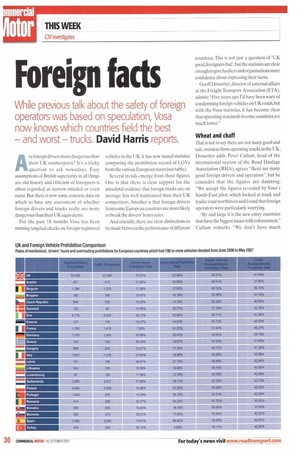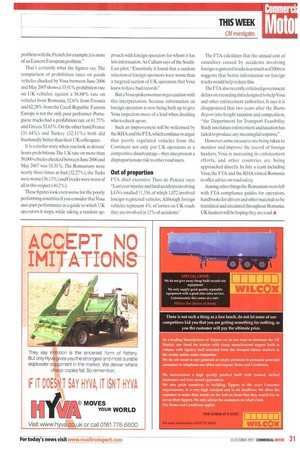Foreign fads
Page 30

Page 31

If you've noticed an error in this article please click here to report it so we can fix it.
While previous talk about the safety of foreign operators was based on speculation, Vosa now knows which countries field the best
and worst trucks. David Harris reports.
Are foreign drivers more dangerous than their UK counterparts? It's a tricky question to ask nowadays. Easy assumptions of British superiority in all things are old history and criticism of foreigners is often regarded as narrow-minded or even racist. But there is now some concrete data on which to base any assessment of whether foreign drivers and trucks really are more dangerous than their UK equivalents.
For the past 18 months Vosa has been running targeted checks on foreign-registered vehicles in the UK; it has now issued statistics comparing the prohibition record of LGVs from the various European states (see table).
Several trends emerge from these figures. One is that there is clear support for the anecdotal evidence that foreign trucks are, on average, less well maintained than their UK competitors. Another is that foreign drivers from some European countries are more likely to break the drivers' hours rules.
And crucially, there are clear distinctions to be made between the performance of different countries. This is not just a question of 'UK good, foreigners bad', but the statistics are clear enough to give hauliers and organisations more confidence about expressing their views.
Geoff Dossetter, director of external affairs at the Freight Transport Association (FTA). admits: "Five years ago I'd have been wary of condemning foreign vehicles on UK roads, but with the Vosa statistics, it has become clear that operating standards in some countries are much lower."
Wheat and chaff
`lhat is not to say there are not many good and safe overseas firms operating trucks in the UK, Dossetter adds. Peter Cullum, head of the international section of the Road Haulage Association (RHA), agrees "there are many good foreign drivers and operators", but he concedes that the figures are damning: "We accept the figures revealed by Vosa's South-East pilot, which looked at truck and trailer road worthiness and found that foreign operators were particularly worrying.
"By and large it is the new entry countries that have the biggest issues with enforcement," Cullum remarks. "We don't have much problem with the French, for example;it is more of an Eastern European problem."
That's certainly what the figures say. The comparison of prohibition rates on goods vehicles checked by Vosa between June 2006 and May 2(X)7 shows a 33.91% prohibition rate on UK vehicles, against a 56.68% rate on vehicles from Romania, 52.6% from Estonia and 62.28% from the Czech Republic. Eastern Europe is not the only poor performer: Portuguese trucks had a prohibition rate of 61.75% and Greece 52.63%. On the other hand France (31.44%) and Turkey (32.11%) both did fractionally better than their UK colleagues.
It is a similar story when you look at drivers' hours prohibitions. The UK rate on more than 50,000 vehicles checked between June 2006 and May 2007 was 10.31%. The Romanians were nearly three times as bad (32.27%), the Turks were worse (36.13%) and Greeks were worst of all in this respect (40.2%).
These figures look even worse for the poorly perfiirming countries if you consider that Vosa uses past performance as a guide to which UK operators it stops, while taking a random ap proach with foreign operators for whom it has less information. As Cullum says of the SouthEast pilot:" Essentially it found that a random selection of foreign operators were worse than a targeted section of UK operators that Vosa knew to have bad records."
But a Vosa spokeswoman urges caution with this interpretation, because information on foreign operators is now being built up to give Vosa inspectors more of a lead when deciding who to check upon.
Such an improvement will be welcomed by the RHA and the FTA,which continue to argue that poorly regulated vehicles from the Continent not only put UK operators at a competitive disadvantage—they also present a disproportionate risk to other road users.
Out of proportion
FTA chief executive Theo de Pencier says: "Last year injuries and fatal accidents involving LGVs totalled 11,336, of which 1,072 involved foreign-registered vehicles. Although foreign vehicles represent 4% of lorries on UK roads they are involved in 12% of accidents." The FTA calculates that the annual cost of casualties caused by accidents involving foreign-registered trucks is as much as I'100m; i t suggests that better information on foreign trucks would help reduce this.
The FTA also recently criticised government delays on recording data designed to help Vosa and other enforcement authorities. It says it is disappointed that two years after the Burns Report into freight taxation and competition, "the Department for Transport Feasibility Study into future enforcement and taxation has failed to produce any meaningful response".
However, some measures are being taken to monitor and improve the record of foreign hauliers. Vosa is increasing its enforcement efforts, and other countries are being approached directly. In July a team including Vosa, the FTA and the RHA visited Romania to offer advice on road safety.
Among other things the Romanians were left with FTA compliance guides for operators, handbooks for drivers and other materials to he translated and circulated throughout Romania. UK hauliers will be hoping they are read. •


























































































































































































